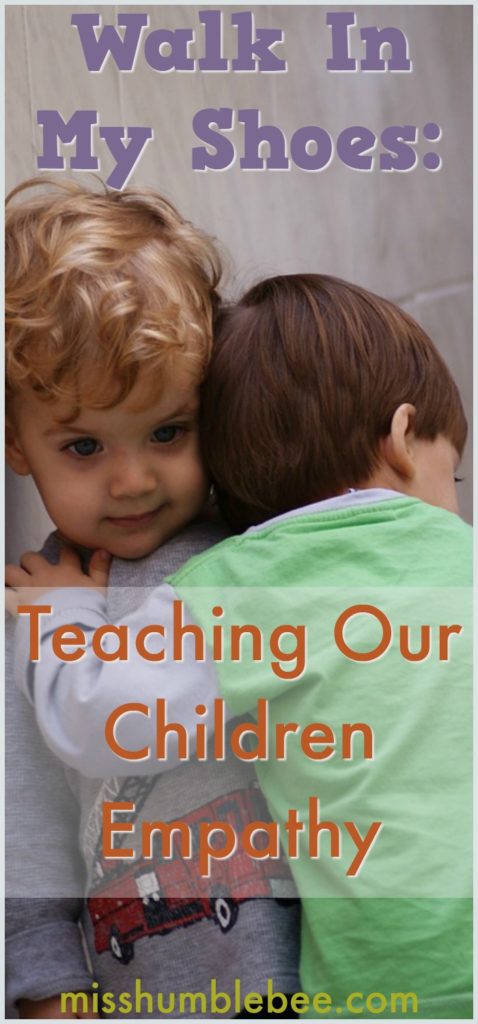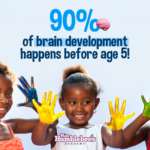We seem to live in a world gone crazy. Every day the news outlets carry stories of horror, hate, and heartbreak. When we focus on it, it’s all too easy to wonder if there is any good left in the world.
However, when we shift our focus, a new picture comes into view. A picture of people running into harm’s way to help each other. A picture of people setting aside their own needs to care for the more pressing needs of others. A picture of empathy.

For the past few weeks, the Miss Humblebee’s Academy blog has been focusing on helping our children become good friends. We’ve discussed seven interpersonal skills they need and we’ve delved deeper into a couple of them, offering a free printable to help you teach your child those skills.
This week we continue on the topic of friendship by looking at a skill that will not only help children in their friendships, but also in their roles as local, national, and global citizens.
Walk In My Shoes: Teaching Our Children Empathy
Empathy is the ability to understand and relate to how another person feels, and although we sometimes think it develops on it’s own, there are many things you can do as a parent to help your child develop empathy.
Help them become self-aware- A child who can’t identify her own feelings or behaviors will also be unable to discern those of other people. You can help by regularly labeling how your child may be feeling.
For example, if your child is crying because she lost her favorite toy, ask her if she’s feeling sad. If she’s excited about an upcoming play date, ask her if she feels happy. As your child becomes more comfortable with the ‘major’ emotions, you can begin to teach the more subtle ones: Frustration, disgust, anticipation, etc.
Look for examples- A child who has a good grasp on her own feelings can begin to recognize them in other individuals. Begin with her own family members and branch out from there.
Observing television characters is a great way to practice since shows will offer some context to help your child determine how the characters feel.
Once your child has a good grasp on discerning the emotions of others through their situations and facial expressions, you can move onto people whose feelings might be harder to distinguish, such as book characters or people you encounter in your day to day life (just be sure to be discreet when observing other people!).
Talk about it- Here’s where a child really begins to grasp the importance of being able to understand other people’s emotions.
Instead of simply having your child identify how another person might be feeling, go a step further and discuss why they might feel that way and how your child would feel if she was in a similar situation. It’s very important at this stage to relate other’s feelings to experiences your child is familiar with.
For example, if her friend is upset about the loss of a beloved pet, you can discuss how she felt when her goldfish died.
When your child can relate other’s feelings and experiences to feelings and experiences she’s had herself, she’ll begin to not just feel empathy, but want to act upon that feeling.
Act on it- Although empathy in and of itself is a wonderful skill to develop, it is when we act upon it that we can truly help other people and develop lasting friendships.
Continuing with the pet example from above, you can not only talk to your child about how her friend is feeling, but also ask her what she would have liked a friend to do for her when she lost her goldfish. With this knowledge in mind, she can go to her friend with a clear idea of how she can show empathy.
By being mindful of the people and situations around you and your child, every day can offer opportunities to practice empathy. It’s a skill we desperately need in the days we live in and one that could truly make a difference for the next generation.
For more information on teaching your child empathy, check out the following resources:
Teaching Empathy: Evidence-Based Tips for Fostering Empathy in Kids :: Parenting Science
The Caring Child: How to Teach Empathy (Age 5) :: Babycenter
Teaching Children Empathy :: New York Times
How do you help your child develop empathy? Tell us in the comments below.











People learn by example. Our politicians need a refresher course on how to treat the poor, the sick,!the gay community, immigrants, minorities, women, etc. We are all created equal!! Have compassion for others. Only vote for those who want to improve our relations with others and welcome people from all walks of life. Build bridges, not walls.